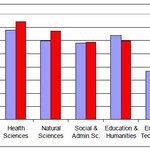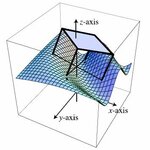Humor

Is your laboratory environment something like this?
Sosban Fach (meaning ‘Little Saucepan’) is a popular Welsh song which recounts the troubles of a harassed housewife. It is particularly associated with the Llanelli Rugby Union Football Club, deriving from Llanelli’s tin plating industry, which used to tin-plate steel saucepans and other kitchen utensils to supply to the British public.
I found myself singing it during harassed moments in the laboratory, at first, simply because I like the song, but I came to realize how appropriate, with a bit of interpretation, it was in a laboratory…

It appears that Hank may have become infected with a virus that originated from his computer. If so, this would represent the first instance of a computer virus capable of acting on a biological host. It has been speculated [mostly by me in an IM] that this could be the result of a biological weapons test. Hank seems to be at a complete loss to explain this virus' origins.
Given the amount of time Hank spends connected to the internet, he is clearly at higher risk than most for such infections, so despite the normal precautions to ensure the computer system doesn't get "…

Biology is tricky and evolutionary biology even trickier - in the modern age, with insights into epigenetics, that trickiness and general complexity means virtually any stance you want to adopt on any issue can claim to be 'biological' if you just say something pithy like 'It's a combination of nature and nurture', which is the biology equivalent of amateur political scientists who say 'If only people would talk to each other we could all get along' about foreign relations.
Sex, though, has been studied in-depth only much more recently, to somewhat speculative effect, and I have often…

“The practice of having Ph.D. graduates employed by the university that trained them, commonly called ‘academic inbreeding’ has long been suspected to be damaging to scholarly practices and achievement ” says a 2010 report in the journal Management Science.
Until recently, precise details regarding the levels of possible damage had not been formally quantified. Progress was made, however, by a joint Portuguese / US research team which examined the academic inbreeding (AI) and scientific productivity (SP) of 414 academics across 14 higher education institutions in Mexico between 1999 and…

Perhaps it was the title: ‘Acquired preferences for piquant foods by chimpanzees.’ but whatever the reason, Paul Rozin, Professor of Psychology at the University of Pennsylvania, found it very difficult to get his research paper published. The work had been inspired by observations the professor had made whilst in Mexico, when he noticed that -
“…virtually everyone in a Mexican village over 5 or 6 years of age liked the burn of chili pepper, but that none of the animals in the village showed a preference for it, even though they ate the pepper daily as they consumed the leftovers of the day…

The word 'Shirk' normally carries quite pronounced negative connotations. But are there circumstances when shirking might have beneficial effects? For example in the efficient operation of teams?
Shirk : verb ‘To avoid work, duties or responsibilities, especially if they are difficult or unpleasant.’ [source: Cambridge Advanced Learner's Dictionary ]
According to new research from Tadashi Sekiguchi associate professor of Game Theory at Osaka Prefecture University, and colleagues from Wakayama University and Kyoto University in Japan the answer is yes.
A theoretical/mathematical framework…

Everywhere on facebook, on yahoo news, on Huff, everyone's talking about the super moon. Some are even wondering if it will cause problems. There's even an article on myths about the moon. Everybody's out taking pictures of the moon and posting it.
Now, readers here know I looooove the moon. Love, love, love it and often photograph it. And then bore the hell out of you with pictures. I hear you in my head groaning, "For God's sake, we get it, you like the moon. It's the same damn moon every month. Why for the love of all that is holy do you keep taking the same pictures?" Because I'm…

There are new clues in the quest for a fully coherent theory of the perception and neural representation of size-variant human vowels in the Mongolian gerbil.
Previous investigations in the US (see: Science 2.0, Beachcombing in Academia, February 15th 2012) found that Mongolian gerbils can easily be trained to recognise vowel sounds in human speech.Now, however, Uwe Firzlaff and colleagues from the Division of Neurobiology, Department Biologie II, Ludwig-Maximilians-Universität München, in Germany, have drawn attention to the fact that the larger the (human) speaker, the lower the formant…

Of all the available publications on 'Aircraft Nose Art', very few have investigated its psychological undercurrents.
An exception is ‘Aircraft Nose Art: From World War I to Today’ (1991). Chapter 1 of which was authored by the late George R. Klare, who was Distinguished Professor of Psychology at Ohio University.
In his essay ‘Why Nose Art, a psychologist’s view’, the professor pointed out that “…psychologists regularly stick their nose into various aspects of human behavior, so why not into nose art?“ In the course of his research he reviewed well over a thousand aircraft-based artworks…

Mathematical theory describing the problem of four-legged wobbly tables stretches back at least as far as 2005, when a paper on the subject of “The Intuitive Table ‘Theorem’ “, was published in the math journal Viniculum. The theorem ran thus: “By rotating a square table over uneven ground, you can ensure that all four legs touch the ground”. Suggesting that, theoretically at least, any wobbling can be eliminated by studious rotation. A few months later, the same authors, Burkard Polster, Marty Ross and QED (the cat) published an update, which is available online, see Turning the…